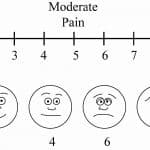
Dysuria or painful urination is experiencing pain or a burning sensation while peeing (urinating). Both men and women can experience dysuria. Women are at higher risk of having dysuria than men.
Often dysuria is a sign of underlying health problems such as vaginal infection, bladder infection, urinary tract infection, prostate diseases, and cancer.
How bad is my dysuria?
Your clinic team will use a Visual Analogue Scale or VAS (see figure on right). It is a pain rating scale to measure the intensity of your pain.
Mild: Pain score of 3 or less on the VAS scale. This pain should not stop you from doing activities of daily life (like grocery shopping, laundry, cooking). You may also experience burning, stinging or itching while peeing.

Moderate: Pain score of 4 to 6. This pain stops you from doing instrumental activities of daily life (preparing meals, managing money, shopping, doing housework, and using a telephone). You may also have persistent painful urination, back pain and pelvic pain.
Severe: Pain score of 7 or higher. This pain is bad enough to stop you from even the most basic (self-care) activities of daily life like eating, dressing, getting into or out of a bed or chair, taking a bath or shower, and using the toilet. Other symptoms are fever, foul-smelling urine, and abnormal discharge from penis or vagina. It is an emergency that requires immediate treatment under your doctor’s supervision.
Warning signs/severe symptoms of dysuria that need immediate medical attention
It is a symptom that causes a burning sensation, pain, blood in urine, unusual discharge from the penis/ vagina, and discomfort. Contact your healthcare provider if you feel discomfort while urinating. It’s important to determine if the symptom is related to a urinary tract infection or another medical cause.
Keep track of symptoms using Ankr (myAnkr web portal or the Ankr app). It will help you describe the pain to your doctor or nurse.
Supportive care for dysuria
- Increase intake of fluids. Drink two to three liters of water every day.
- Change the soiled urinary incontinence pad, if you are using one.
- After urinating, take some new tissue and wipe away any urine from the inside of your vaginal lips.
- Avoiding the use of harsh soaps or other chemical products near the genitals that could potentially lead to irritation.
- Resting and taking medications as directed by physician can relieve most symptoms.
What caused my dysuria?
- Bladder infection (cystitis)
- Vaginal infection.
- Urinary tract infection.
- Endometritis
- Other (diverticulosis and diverticulitis).
- Inflammation of the bladder or urethra (urethritis)
Painful urination in men may be the result of:
- Urinary tract infection
- Cancer
- Other infections (diverticulosis and diverticulitis).
- Prostate disease
How can Ankr help with your dysuria (Painful urination)?
Don’t try to treat a dysuria by yourself. Use Ankr to:
(1) learn about the common symptoms and causes of dysuria
(2) send message to your Doctor if they use Ankr platform*
(3) be better informed about how to prevent another dysuria
